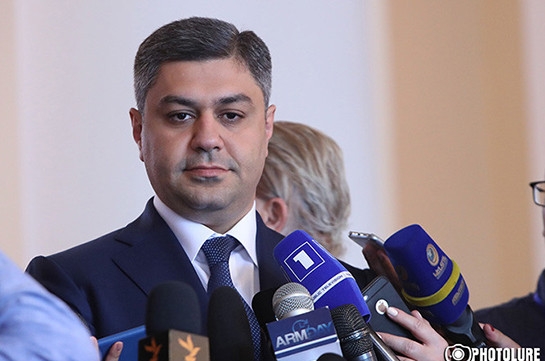Armenian House of Cards: Vanetsyan Resigns
The resignation of the head of the National Security Service of Armenia, Artur Vanetsyan, has become the hottest topic in Armenia. The resignation was both wanted and unexpected.
Vanetsyan left his position with a political statement which was posted on the official Facebook page of the National Security Service, seeing the former head of the Security Service criticize the Prime Minister and his political team.
The response of the PM was quick and sharp. The spokesperson of Pashinyan Vladimir Karapetyan responded that he doesn’t know who the author of the statement may be or where it was written but, “I hope the text was not written in the PR office of the criminal, a corrupted former regime of Armenia, who somehow escaped criminal charges," said Karapetyan.
The resignation of the head of the security system was welcomed on social networks in Armenia, with citizens bringing analogies from the 1998 coup when the head of the National Security Ministry Serzh Sargsyan, together with then Minister of Defense of Armenia Vazgen Sargsyan and the PM, Robert Kocharian, forced the democratic President of Armenia Levon Ter-Petrosyan to resign as he was for signing a compromise deal with Azerbaijan to regulate the Nagorno Karabakh conflict.
This coup turned Armenia into an authoritarian regime, which 20 years later became a reason for a peaceful democratic revolution.
The heads of the army and national security traditionally hold very strong positions in the political landscape of Armenia due to a permanent conflict with Azerbaijan. Vanetsyan was no exception.
Vanetsyan’s appointment as the Head of the National Security Service of Armenia cames as a surprise to most citizens in Armenia. In a very short time, he succeeded in becoming one of the most popular members of the government. However, in September 2018, when a phone conversation with the PM was disclosed, recorded and published online, Vanetsyan was badly criticized for not being able to secure his conversation with the head of state.
Despite rumors about the coming resignation of Vanetsyan, the move was a big surprise for most Armenians, as Vanetsyan was considered one of the closest and most loyal figures of Pashinyan. Yet his statement and the response released by the PM's office gives the impression that Vanetsyan was involved in suspicious affairs with the representatives of the former regime of the country, whose media stations made a “national tragedy” after the resignation of Vanetsyan.
According to political analysts and experts, Vanetsyan’s resignation could also have been influenced by Russia, and the trial of a close ally of Putin, Kocaharyan. The Russian president is congratulating the birthday of his imprisoned former colleague the second year in a row, demonstrating his support for Kocharyan, while the Russia-controlled TV channels periodically criticize the Armenian government for imprisoning Kocharyan, naming his trial political persecution.
On September 17 there is a very important court hearing on Kocharian’s case and Vanetsyan’s resignation also gives the impression that this was arranged by the court listening in on the former President of Armenia Robert Kocharyan, who is currently imprisoned and on trial for overthrowing the constitutional order in 2008, when he ignoring the constitutional ban and used the army against the political opposition, opening fire on a peaceful demonstration, killing 10 and wounding more than 200 demonstrators in Yerevan center.
By Karen Tovmasyan












